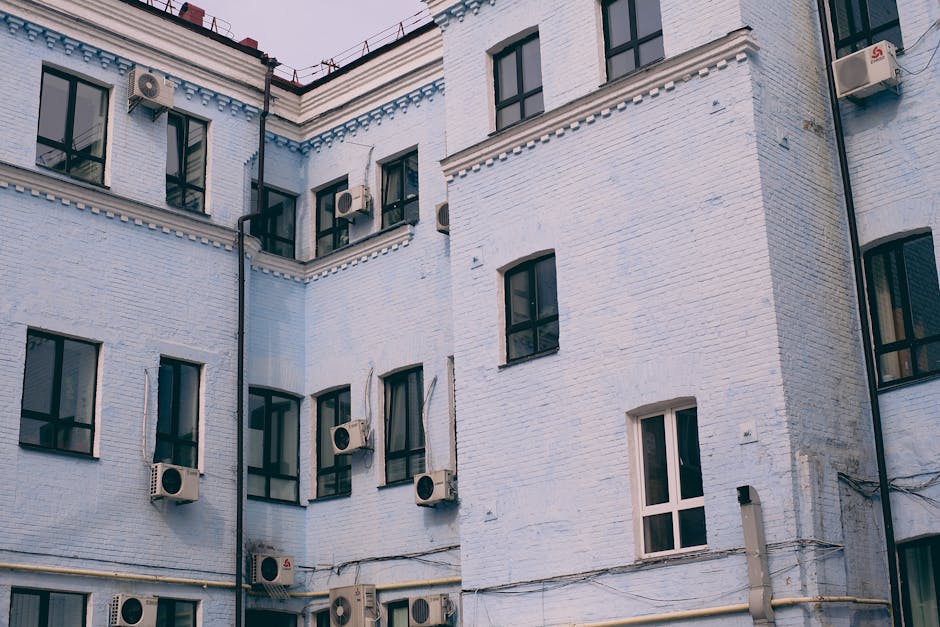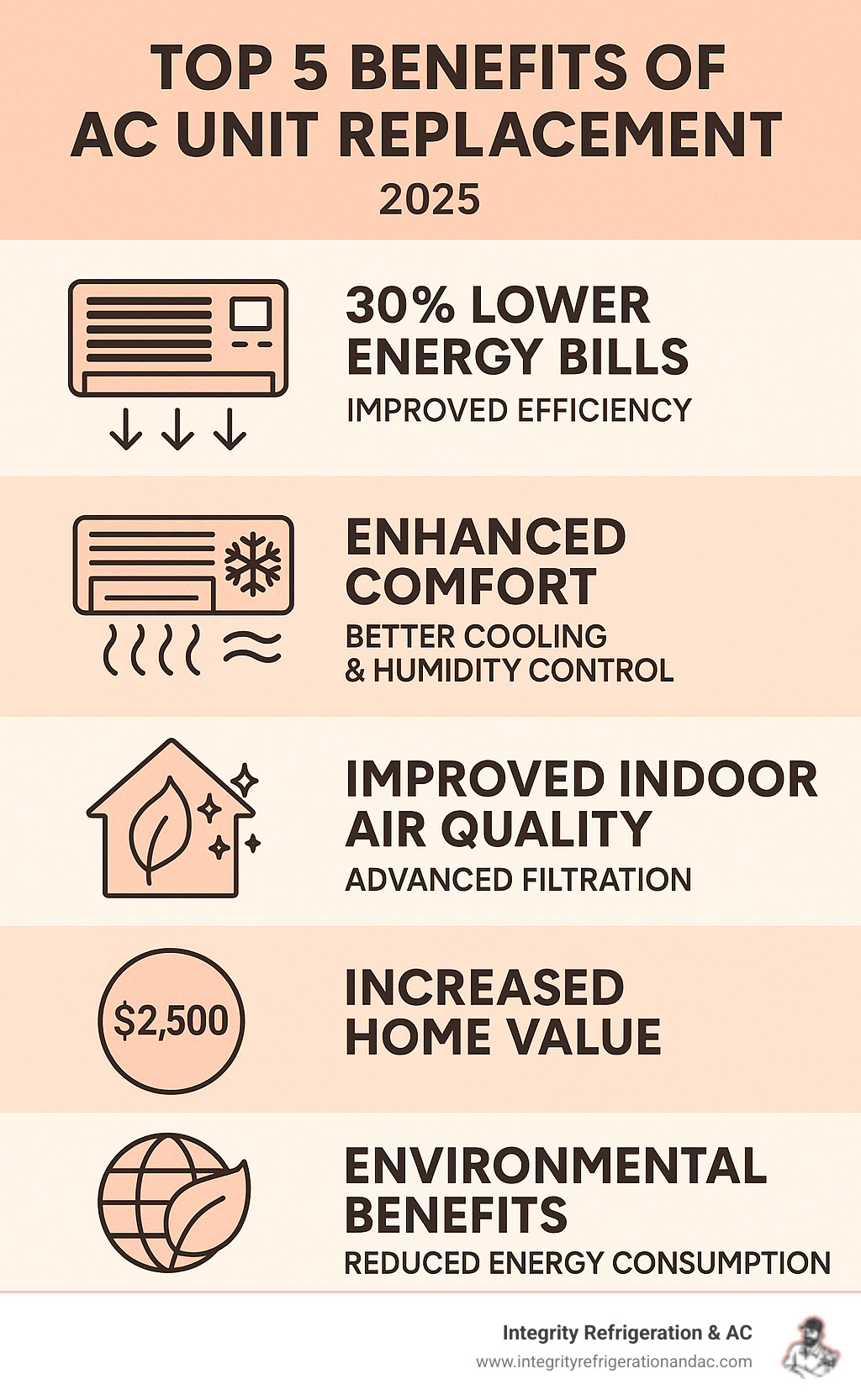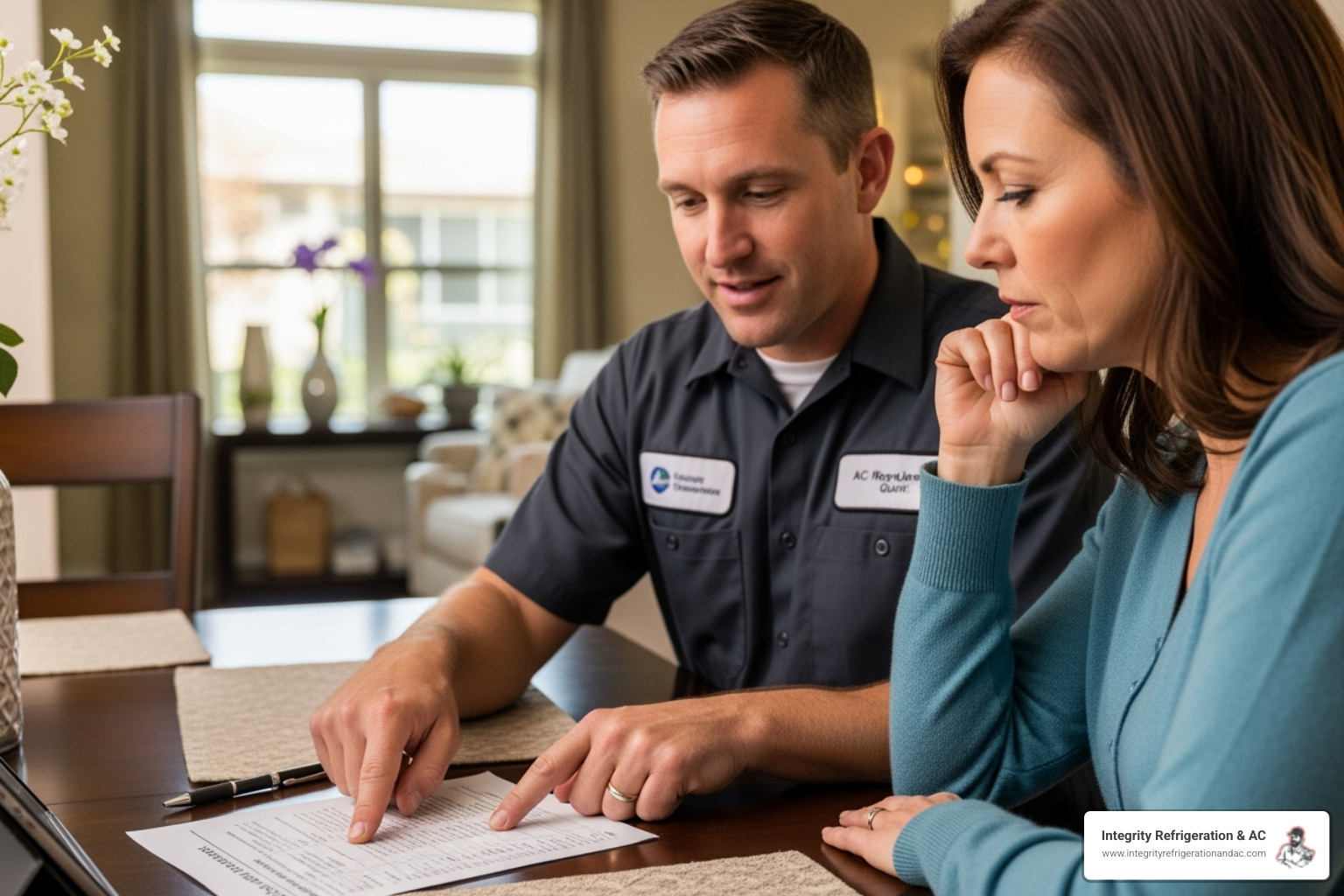Upgrade Your Comfort: A Comprehensive Guide to AC Unit Replacement


Upgrade Your Comfort: A Comprehensive Guide to AC Unit Replacement

Why AC Unit Replacement Matters for Florida Homeowners
AC unit replacement becomes essential when your cooling system can no longer keep up with Florida's demanding climate. Here's what you need to know:
Key Signs You Need AC Replacement:
- Age: Units over 10-15 years old are prime candidates
- Frequent repairs: When repair costs exceed 50% of replacement cost
- Rising energy bills: Older units lose efficiency over time
- Uneven cooling: Hot and cold spots throughout your home
- R-22 refrigerant: Outdated systems using phased-out refrigerants
Average Replacement Costs:
- Basic systems: $3,000-$5,000
- Mid-range systems: $5,000-$8,000
- High-efficiency systems: $8,000-$15,000+
Living in Polk County means your air conditioner works hard year-round. Unlike homeowners in milder climates, Florida residents can't afford to wait when their AC starts failing. As one industry expert notes: "Regardless of how well you maintain an older AC unit, it will always be less efficient than a modern system."
The good news? Today's AC units offer significant improvements over older models. Modern systems provide better humidity control, quieter operation, and can reduce energy bills by 20-40% compared to units installed just 10 years ago.
Smart financing options make replacement more affordable than ever. Many homeowners find that their monthly savings on energy bills help offset the cost of a new system, especially when combined with available rebates and tax credits.

Recognizing the Signs: When Is It Time for an AC Unit Replacement?

Nobody wants to think about replacing their air conditioner until it's too late. We get it – your AC has been faithfully cooling your home through countless Florida summers. But like that trusty old car in your driveway, there comes a time when repairs just don't make sense anymore.
The truth is, recognizing the warning signs early can save you from sweltering through a breakdown during the hottest week of the year. Even better, it gives you time to plan and budget for your AC unit replacement instead of scrambling for an emergency solution.
Age is more than just a number when it comes to air conditioners. If your unit has been chugging along for 10 to 15 years, it's officially in senior citizen territory. While some systems might limp along a bit longer, they're working much harder than they should to keep you comfortable. Think of it like asking a marathon runner to sprint – eventually, something's got to give.
Frequent breakdowns are another telltale sign that your system is crying for retirement. When you're calling for repairs every few months, or when a single repair bill costs more than half of what a new unit would cost, your AC is basically waving a white flag. We've seen homeowners spend thousands trying to keep an old system alive, only to replace it six months later anyway.
Have you noticed your utility bills creeping up even though your usage hasn't changed? Aging AC units lose their efficiency over time, kind of like how your smartphone battery doesn't last as long after a couple of years. Your system might still be cooling, but it's working overtime to do it.
Uneven cooling throughout your home is another red flag. If your living room feels like the Arctic while your bedroom feels like a sauna, your system is struggling to do its job properly. This often happens when units are improperly sized or when key components start failing.
Listen to your AC unit – literally. Strange noises like grinding, squealing, or banging aren't normal. Your system should hum quietly in the background, not sound like it's auditioning for a horror movie soundtrack. These sounds usually mean expensive internal components are wearing out.
Foul odors coming from your vents are never a good sign. Musty smells often indicate mold growth, while burning odors could signal electrical problems that need immediate attention. Your nose knows when something's wrong.
Finally, if your system uses R-22 refrigerant, it's definitely time for an upgrade. This older refrigerant has been phased out, making repairs incredibly expensive. It's like trying to find parts for a 1970s television – technically possible, but not practical.
For more detailed guidance on making this important decision, check out our helpful resources: AC Repair vs. Replacement: Making the Right Decision and 3 Common Signs You Need to Opt for AC Replacement.
The good news? Recognizing these signs early means you're in control. You can plan your AC unit replacement on your timeline, not your air conditioner's.
Decoding the Cost: What Influences AC Replacement Prices?

We know that AC unit replacement costs can feel overwhelming at first glance. It's like walking into a car dealership – there are so many options, features, and factors that influence the final price tag. But here's the good news: understanding what drives these costs helps you make smart decisions and find the right balance between your budget and your comfort needs.
The truth is, AC unit replacement isn't a one-size-fits-all situation. Your neighbor might pay significantly less (or more) than you, and that's completely normal. Every home has unique requirements, and every homeowner has different priorities when it comes to efficiency, features, and long-term savings.
Think of it this way: you wouldn't buy a compact car to haul a boat, and you wouldn't install a massive commercial unit in a cozy cottage. The key is finding the perfect match for your home, your lifestyle, and your wallet. For insights specific to our local market, check out our detailed guide on Why Do AC Replacement Costs Vary in Winter Haven, FL?
Key Factors Driving the Cost of an AC Unit Replacement
Let's break down what really influences your investment in a new cooling system. Understanding these factors helps you see where your money goes and why quality matters.
Unit size is the foundation of everything else. We measure AC units in "tons" – and no, that doesn't mean weight! One ton equals 12,000 BTUs of cooling power. Your home's square footage determines how many tons you need. A smaller home might need just 1.5 tons, while larger homes can require 4 tons or more. Getting this right is crucial because an undersized unit will struggle to cool your home, while an oversized unit wastes energy and creates humidity problems.
The SEER2 rating is like your car's gas mileage – it tells you how efficiently your AC uses electricity. Higher SEER2 ratings mean lower monthly bills, but they also mean higher upfront costs. It's a classic case of spending more now to save more later. Most modern systems start around SEER2 14, but high-efficiency models can reach 20 or higher.
Installation labor represents the expertise and time needed to properly install your system. This isn't a DIY project – professional installation ensures your unit operates safely, efficiently, and maintains its warranty. The complexity of your specific installation affects labor costs, especially if your home presents unique challenges.
Sometimes your existing ductwork needs attention too. If your ducts are leaking, improperly sized, or damaged, they'll sabotage your new system's performance. We'd rather address these issues upfront than watch your new AC struggle because of old, problematic ductwork.
Electrical work might be necessary if your home's wiring can't handle your new system's requirements. Modern, efficient units sometimes need dedicated circuits or updated wiring to meet current safety codes. This protects both your investment and your family's safety.
Finally, permits ensure your installation meets local building codes and safety standards. These fees are typically small compared to your overall investment, but they're essential for legal compliance and peace of mind.
Managing the Investment: Financing and Rebates
Here's where we get practical about making your AC unit replacement affordable. We believe everyone deserves to be comfortable in their home, regardless of their current financial situation. That's why we've built our business around flexible solutions that work for real families.
Flexible financing options are our specialty. We offer payment plans that spread your investment over time, often with competitive rates or special promotional periods. This means you can enjoy the comfort and savings of a new system right away, without emptying your savings account.
Home improvement loans from banks and credit unions offer another path forward. These loans typically feature fixed interest rates and reasonable terms specifically designed for projects like HVAC replacement. Many homeowners find these loans offer better rates than credit cards.
Credit cards can work for some situations, especially if you have access to low-interest promotional offers. Just be cautious about high-interest cards for large purchases – the savings from your efficient new system shouldn't be eaten up by credit card interest.
Don't overlook local utility rebates from companies like Florida Power & Light. These programs reward homeowners who choose energy-efficient systems, and the rebates can significantly reduce your upfront costs. It's like getting paid to save energy!
Federal tax credits sometimes apply to high-efficiency HVAC equipment. These incentives change periodically, so it's worth asking about current programs. The Inflation Reduction Act has created new opportunities for homeowners investing in efficient systems.
For more detailed budgeting strategies, explore our comprehensive guide: AC Installation Budgeting Tips for Cost-Effective Cooling. We're here to help you find a solution that fits your budget and delivers the comfort your family deserves.
Choosing Your New System: A Guide to Modern AC Options
When it comes to AC unit replacement, picking the right system can feel like choosing a new car – there are so many options, features, and price points to consider! Don't worry, though. We're here to walk you through the modern AC landscape and help you find the perfect match for your Florida home.
Today's air conditioning systems are light-years ahead of what was available even a decade ago. You'll find systems that can adjust their cooling output automatically, units that whisper-quiet operation, and models that can slash your energy bills while keeping you more comfortable than ever before.
The key is understanding what each type offers and how it matches your specific needs, budget, and home layout.
| System Type | Efficiency | Comfort | Upfront Cost |
|---|---|---|---|
| Single-Stage | Good baseline efficiency | Basic comfort with some temperature swings | Most affordable initial investment |
| Two-Stage | Better efficiency with improved part-load performance | Improved comfort with fewer temperature fluctuations | Moderate investment |
| Variable-Speed | Highest efficiency with precise temperature control | Premium comfort with consistent temperatures and humidity | Higher initial cost with maximum long-term savings |
Single-stage systems are the workhorses of the AC world. They operate at full capacity whenever they're running – think of it like a light switch that's either completely on or completely off. While they're the most budget-friendly option upfront, they can create those familiar temperature swings where your home feels chilly right after the AC shuts off, then gradually warms up until it kicks on again.
Two-stage systems offer a nice middle ground. These units can run at either high or low capacity depending on your cooling needs. On milder days, they'll run at the lower stage, using less energy and providing more consistent temperatures. When Florida's summer heat really cranks up, they'll shift to high stage for maximum cooling power.
Variable-speed systems are the luxury cars of air conditioning. They can adjust their output anywhere from about 30% to 100% capacity, making tiny adjustments throughout the day to maintain your exact desired temperature. They're incredibly efficient, remarkably quiet, and excel at removing humidity – something that's crucial in our Florida climate.
For a comprehensive look at all the factors you should weigh, check out our guide: Factors to Consider Before AC Replacement: A Comprehensive Checklist.
Sizing and Efficiency: The Foundation of Comfort
Getting the size right is absolutely critical for your new system's performance. We can't stress this enough – bigger isn't always better when it comes to air conditioning!
Every proper AC unit replacement starts with what's called a Manual J Load Calculation. This detailed assessment considers your home's square footage, insulation levels, window placement, ceiling height, and even which direction your house faces. It's like getting a custom measurement for a custom suit – it ensures your new system fits your home perfectly.
Oversized units are actually a major problem in Florida. When an AC unit is too big, it cools your home quickly but shuts off before it has time to remove humidity properly. You end up with a home that feels cold and clammy – not exactly the tropical paradise you're going for! Plus, all that frequent on-and-off cycling wears out components faster and wastes energy.
The SEER2 rating tells you how efficiently your system converts electricity into cooling. Higher numbers mean lower electric bills, which is especially important when your AC runs most of the year. Modern systems typically range from the minimum required SEER2 ratings up to ultra-high-efficiency models with SEER2 ratings above 20.
Energy Star certification is your assurance that a system meets strict efficiency guidelines. These certified systems often qualify for utility rebates and tax credits, helping offset the initial investment.
The long-term savings can be substantial. A high-efficiency system might cost more upfront, but the monthly energy savings often pay for the difference over the system's lifetime. For homeowners committed to both comfort and environmental responsibility, we recommend exploring The Eco-Friendly Choice: Sustainable Cooling with AC Replacement.
Understanding AC System Types and Features
Modern AC systems come packed with features that would have seemed futuristic just a few years ago. Understanding these options helps you choose the system that best matches your lifestyle and priorities.
Compressor technology is where much of the innovation happens. Single-stage compressors run at one speed – full blast. Two-stage compressors offer both high and low settings for better efficiency and comfort. Variable-speed compressors can adjust their output continuously, like having a dimmer switch for your cooling.
Sound performance matters more than you might think. Nobody wants their relaxing evening interrupted by a noisy AC unit cycling on. Modern systems are measured in decibels (dBA), with quieter units operating at around 55 dBA – about as loud as a normal conversation.
Humidity control is especially important in Florida's muggy climate. Variable-speed systems excel here because they run longer at lower speeds, giving them more time to pull moisture from the air. Some systems even offer improved dehumidification modes for those extra-sticky days.
Don't forget about heat pumps – these versatile systems can both cool and heat your home efficiently. In Florida's mild winters, a heat pump can be much more efficient than traditional electric heating.
Ductless mini-split systems deserve consideration if you're dealing with home additions, rooms that never seem comfortable, or homes without existing ductwork. These systems offer zone control, allowing different areas of your home to be set to different temperatures.
The beauty of working with experienced professionals is that we help you sort through all these options to find what truly makes sense for your home, budget, and comfort preferences.


